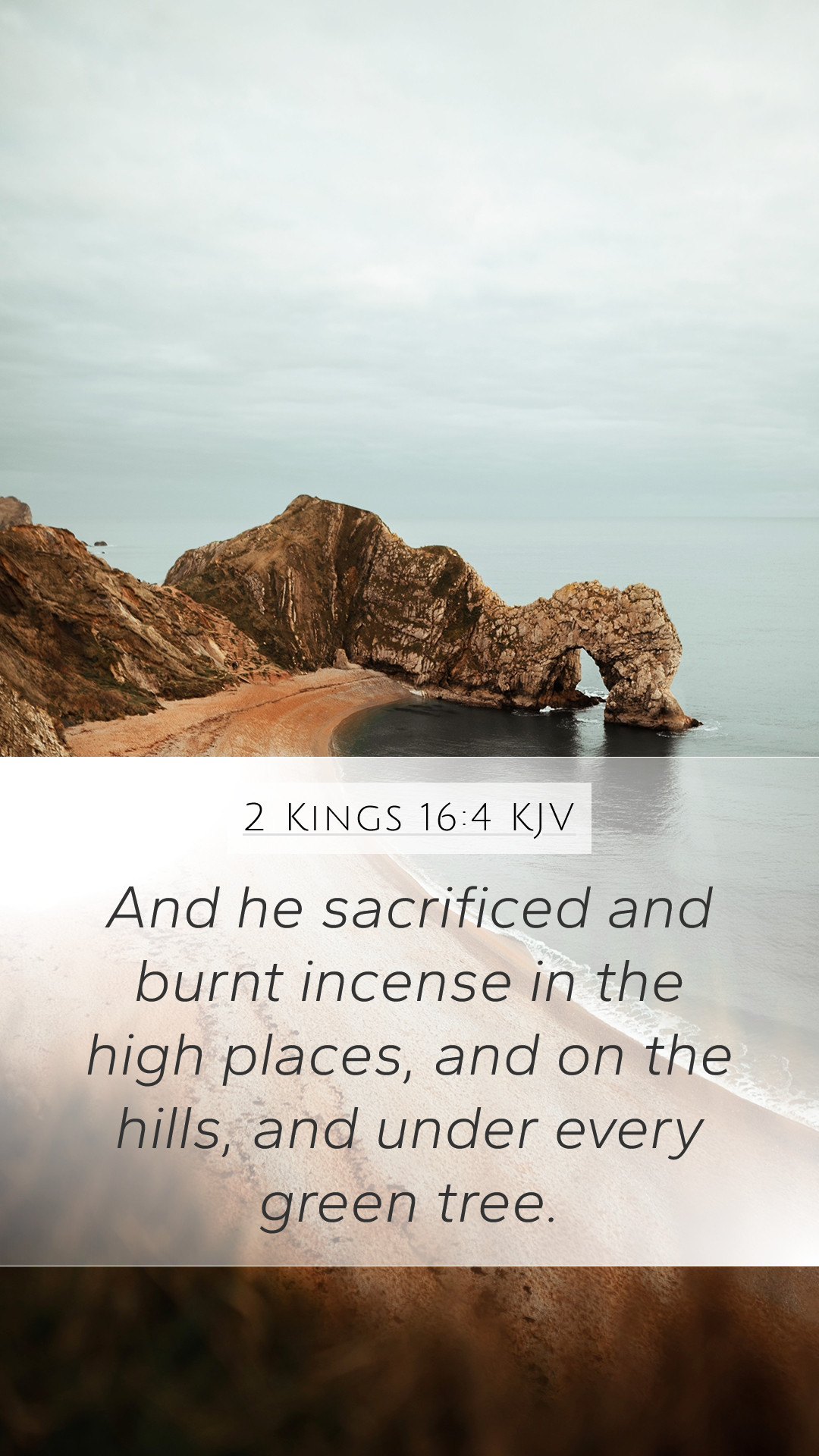Old Testament
Genesis Exodus Leviticus Numbers Deuteronomy Joshua Judges Ruth 1 Samuel 2 Samuel 1 Kings 2 Kings 1 Chronicles 2 Chronicles Ezra Nehemiah Esther Job Psalms Proverbs Ecclesiastes Song of Solomon Isaiah Jeremiah Lamentations Ezekiel Daniel Hosea Joel Amos Obadiah Jonah Micah Nahum Habakkuk Zephaniah Haggai Zechariah Malachi2 Kings 16:4 Meaning
What is the meaning of 2 Kings 16:4?
And he sacrificed and burnt incense in the high places, and on the hills, and under every green tree.
2 Kings 16:4 Bible Verse Meaning
Understanding 2 Kings 16:4
The verse 2 Kings 16:4 states, "And he sacrificed and burnt incense in the high places, and on the hills, and under every green tree." This verse presents a glimpse into the religious practices of King Ahaz of Judah, illustrating his departure from the commandments of God. Below, we explore the meanings and commentary surrounding this verse as compiled from various public domain sources, providing insights for those seeking a deeper understanding of scripture.
Bible Verse Meanings and Interpretations
2 Kings 16:4 serves as a crucial text in understanding the spiritual decline in Judah during Ahaz's reign. This commentary synthesizes insights from Matthew Henry, Albert Barnes, and Adam Clarke to illuminate the verse’s significance in the larger biblical narrative.
Matthew Henry's Commentary
According to Matthew Henry, this verse highlights the idolatrous practices that Ahaz embraced, showcasing a stark contrast to the worship prescribed by the Mosaic Law. He notes that Ahaz’s actions were motivated by a desire to seek assistance from foreign powers, specifically through the incorporation of the worship practices of neighboring nations. This inclination represents a tragic departure from true worship and devotion to Jehovah. Henry emphasizes that Ahaz's choices led Judah into further corruption and idolatry, illustrating the broader implications of forsaking God for worldly alliances.
Albert Barnes' Observation
Albert Barnes takes a slightly different approach, suggesting that the "high places" mentioned in this verse symbolize not only idolatrous worship but also the failure to uphold the rightful, centralized worship of God in Jerusalem. Barnes elucidates that Ahaz sacrificed on these high places in an attempt to blend ancient pagan rituals with the worship of Yahweh, resulting in a syncretism that plagued Judah. Furthermore, he points out that such practices were directly opposed to the clear commandments given to the Israelites concerning worship locations, indicating a significant breach of covenantal fidelity.
Adam Clarke's Exegesis
In Adam Clarke's exposition, he reiterates and expands on the theme of idolatry, explaining that the act of burning incense under "every green tree" was a common practice among the Canaanites, representing fertility worship. Clarke underscores the inherent dangers in compromising true religion with pagan practices, suggesting that this habit of aligning with idolatrous customs was not only a personal failing of Ahaz but also set a dangerous precedent for the people of Judah. Clarke warns that such actions provoke divine judgment, and the consequences of Ahaz's actions are felt throughout the nation.
Detailed Analysis of the Verse
The juxtaposition of Ahaz’s royal authority and his subservience to foreign gods raises critical questions about leadership, faith, and moral responsibility. The repeated references to high places and green trees reinforce the theme of misplaced loyalty—while Judah was called to honor God alone, the king’s actions suggest a heart turned away from divine instruction.
Historical Context and Application
Understanding the historical context is vital for grasping the full significance of 2 Kings 16:4. During Ahaz's reign, Judah faced political instability, threats from Israel and Syria, and an evolving religious landscape. By succumbing to the temptation of idolatry and foreign alliances, Ahaz betrayed the covenant relationship with God, leading to disastrous spiritual and social consequences.
Applying the Lessons of 2 Kings 16:4
For modern readers, the implications of this verse are profound. It serves as a cautionary tale about the dangers of compromising one’s faith, and the consequences of allowing secular culture to dictate spiritual practices. Bible study groups can use this passage as a point of discussion regarding contemporary issues like syncretism, the relevance of Old Testament laws, and the importance of faithful leadership. This promotes a deeper understanding of Scripture and its application to today's believers.
Additional Bible Cross References
- 2 Chronicles 28:1-2 - Summarizes the reign of Ahaz, emphasizing his unfaithfulness.
- 2 Kings 17:7-19 - Discusses the causes of Israel’s exile, including idolatry.
- Exodus 34:12-16 - Warns against making covenants with other nations and adopting their religious practices.
Conclusion
In conclusion, 2 Kings 16:4 serves as a significant warning against the perils of idolatry and the vital importance of fidelity to God's commands. By synthesizing insights from established public domain commentaries, we gain a deeper understanding of this verse, prompting reflection and application in our spiritual lives. This verse is not merely historical; it challenges us to examine our own fidelity to God in a world filled with competing loyalties and distractions.


